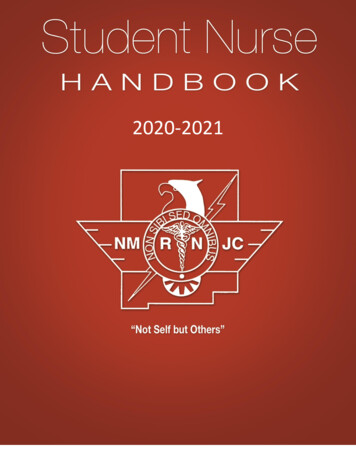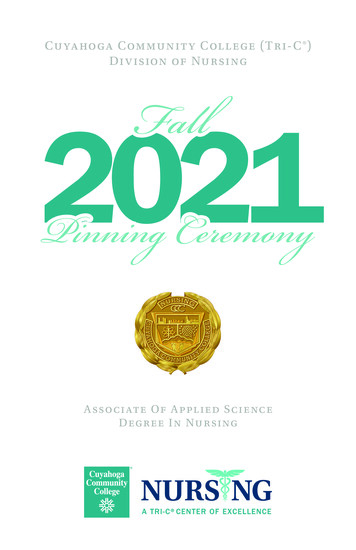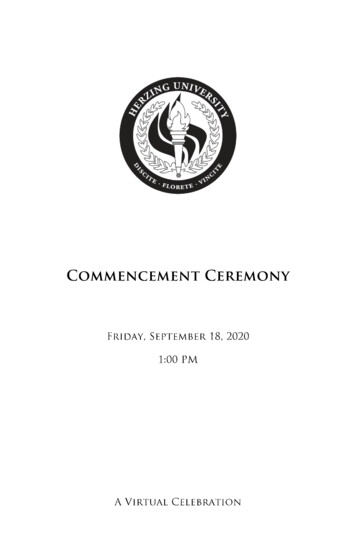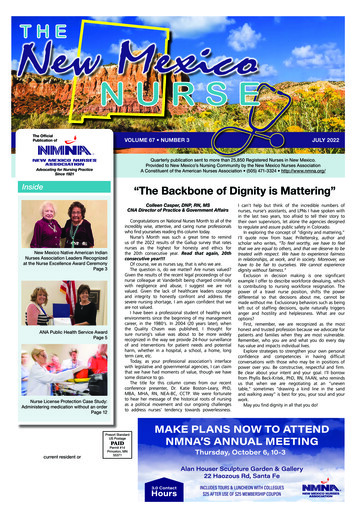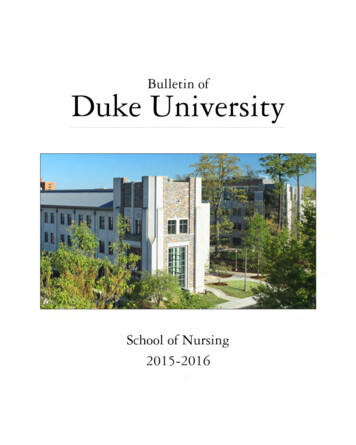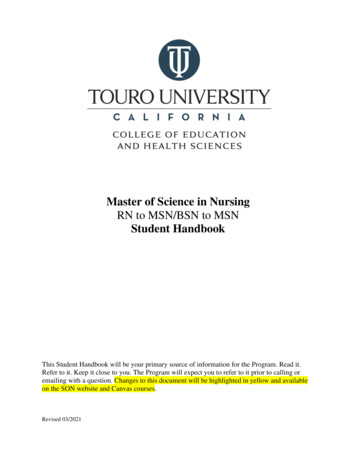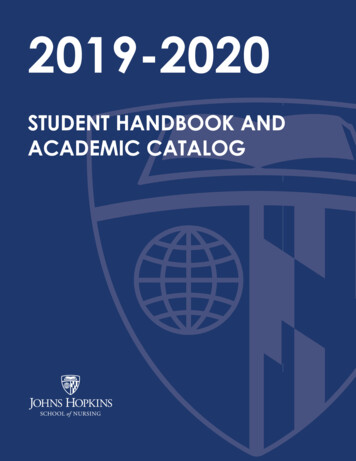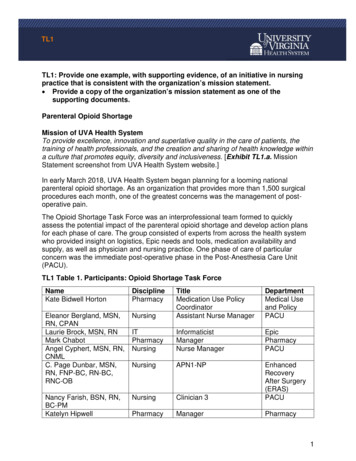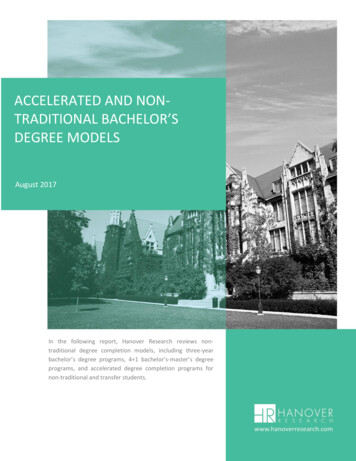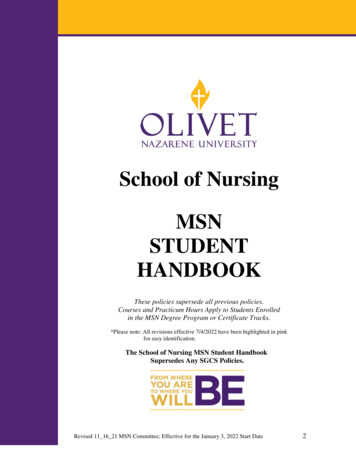
Transcription
School of NursingMSNSTUDENTHANDBOOKThese policies supersede all previous policies.Courses and Practicum Hours Apply to Students Enrolledin the MSN Degree Program or Certificate Tracks.*Please note: All revisions effective 7/4/2022 have been highlighted in pinkfor easy identification.The School of Nursing MSN Student HandbookSupersedes Any SGCS Policies.Revised 11 16 21 MSN Committee; Effective for the January 3, 2022 Start Date2
TABLE OF CONTENTSHANDBOOK AGREEMENT PAGE7History of the Nursing Program8Nursing Program Foundation10Mission10Philosophy10Program Goals10Program Outcomes11Accreditation11Key Terms and Definitions12MSN PROGRAM CORE AND TRACK OUTCOMES13MSN DEGREE REQUIREMENTS AND PROGRAM PLAN15MSN NURSING COURSE DESCRIPTIONS15MSN BENCHMARK ASSIGNMENTS15MSN COURSES MATCHED TO BENCHMARKS15MSN ADMISSIONS, PROGRESSION, AND RETENTION POLICIES16Admission Requirements16FNP Practicum Out of State Approval17Transfer Policies17Return to the MSN Program17Dismissal From Another University17Sample Full-Time Course Schedule18Sample Full-Time FNP Course Schedule18Sample Part-Time Course Schedule19Revised 11 16 21 MSN Committee; Effective for the January 3, 2022 Start Date3
Sample Post-Certificate FNP Course schedule19Progression Policies20MSN Withdrawal Policy21Practicum Requirements22Encumbered RN License22FNP Course Audits22Student Request to Change Track22APPEALS, ACADEMIC POLICY APPEALS, & GRIEVANCE PROCEDURES 23School of Nursing Procedure23ACADEMIC INTEGRITY AND PROGESSIONAL BEHAVIOR24Ethics/Plagiarism24Discussion Forum Code of Conduct25Academic Problem-Solving Chain of Command25Proprietary Trademark25Kaltura25ACADEMIC INFORMATION AND POLICIES26Attendance26Online Course Week – Start and End Dates26The Course Week26Submission Times26Student Participation26Assignments27Revised 11 16 21 MSN Committee; Effective for the January 3, 2022 Start Date4
Late Work Policy - Nursing27Discussions27MSN Examination Policy27Rescheduling of Examination28Incomplete Grades28Grade Evaluation Criteria29Clinical/Practicum Compliance29Drug Screening Policy30“For Cause” Drug Screening30Reapplication for Entry after Positive Drug Screen31Readmission Policy Following Positive Drug Screening31Criminal Background Checks31Technology Requirements31ACADEMIC SUPPORT SERVICES32Disability Support Services32Pastoral Services32Health and Well-Being32Benner Library32APA Guidance-Benner library33Graduate Education Resources33UpToDate 34Revised 11 16 21 MSN Committee; Effective for the January 3, 2022 Start Date5
PROGRAM EVALUATION35GRADUATION REQUIREMENTS35CERTIFICATION EXAMS36SHARED GOVERNANCE AND STUDENT ORGANIZATIONS36Sigma Theta Tau36AACN’s Graduate Nurses Association36Additional Policies36MSN TELEPHONE DIRECTORY37AMERICAN NURSES ASSOCIATION38PRIVACY AND CONFIDENTIALITY UNDER THE HEALTH INSURANCEPORTABILITY AND ACCOUNTABILITY ACT OF 1995 (HIPAA)39Revised 11 16 21 MSN Committee; Effective for the January 3, 2022 Start Date6
OLIVET NAZARENE UNIVERSITYSCHOOL OF NURSINGHandbook AgreementI, the undersigned, agree to the use of my course work and/or test scores, during my academictenure at Olivet Nazarene University, for the purpose of evaluation and research, knowing theinformation will be presented as aggregated data. I understand my work/scores will not be able tobe identified as mine in any published results, designed to enhance the overall quality of this andother nursing programs. As a graduate student, I understand the importance of participating inresearch designed to improve our MSN Program.In addition, I have reviewed Olivet Nazarene University MSN Nursing Student Handbook, whichis available on the Benner Library website. I accept responsibility for knowledge of thehandbook contents and agree to abide by the standards and academic policies found herein. Iaccept responsibility for knowledge of the handbook contents of all new versions that might bedistributed throughout my program.I understand that it is advised that I complete the Olivet Online Orientation training prior to thestart of my first course.I understand I am responsible for monitoring and using my ONU email and keeping mycontact information up-to-date with Olivet, as this is how the Nursing Faculty andAdministration will communicate with me.I understand the requirements for my declared track and its practicum are my responsibility, andto comply with the requirements outlined in my track’s Student Practicum Requirements Courseand Practicum Guidelines Packet.Print Name:Signature:Date:(month/day/year)Revised 11 16 21 MSN Committee; Effective for the January 3, 2022 Start Date7
History of the Nursing ProgramAs early as 1959, the possibility of initiating a baccalaureate nursing program was considered byOlivet Nazarene (then) College administrative members who did not find it feasible to initiate aprogram at that time. However, recognition of the need for nurses and the discontinuance of St.Mary’s hospital diploma program in Kankakee prompted reconsideration early in 1966. At theMay 1966 meeting of the Olivet Board of Trustees, approval was given for the development of abaccalaureate degree program in nursing.Assistance in planning the program was given by the Department Chair at Northern IllinoisUniversity and a nurse coordinator of the Illinois Department of Registration and Education. BySeptember of 1966, the first chair, Faye Riley was employed to develop and lead the newlyorganized Department of Nursing. The first students to enroll in the nursing program started inthe fall of 1967. The Dedication program on October 1968 indicates there were 34 studentscontinuing in the course.Classes met in various buildings of the campus. The first Department of Nursing office waslocated in Reed Hall of Science. Also, the lecture hall of Reed was used for classes requiringdemonstrations. Rooms of Wellman Hall as well as in a college-owned building on MarseillesStreet were used for teaching other classes. Later, the office of the Department of Nursing waslocated in Burke Hall. A generous gift from Mr. and Mrs. Gerett M. Wisner and a federal grantmade it possible to construct a free-standing building dedicated for the nursing program.Groundbreaking for the Wisner Hall for Nursing Education was in February 1970 and was firstused in 1971. Wisner Hall provided four classrooms, a student lounge, a resource center with 24carrels (each equipped with tape and viewing machines), the Evelyn Witthoff - GeraldineChappell auditorium (respectively named for a Physician – RN missionary team to India)capable of seating 150 students, office space for 20 faculty members, and a faculty lounge.Originally the Audio-Visual Department of the college occupied a large area in Wisner Hall.That space was made available to the nursing department when the audio-visual equipment wasmoved to Benner Library in 1976. Other departments and offices have shared the building spacethrough the years as well.The building remains a beautiful testament to the faithfulness and generosity of the Wisners.Wisner has been updated with a Virtual Hospital, high fidelity simulation manikins, and 50computer stations for study, standardized testing, and interactive learning.The Department of Nursing was designated a Division of Nursing in the spring of 1977 by thecollege administration. The Division of Nursing received full approval from the National Leaguefor Nursing in 1979 with the most recent approval in 1993. The nursing program madeapplication to the Commission for Collegiate Nursing Education (CCNE) and receivedpreliminary approval in 1997, and full approval in 2001. In 1990, the Division of Nursingestablished a non-traditional track of the program of nursing for registered nurses with anassociate degree or a three-year diploma desiring the Bachelor of Science Degree in Nursing(RN-BSN). The first class began in January 1991.Revised 11 16 21 MSN Committee; Effective for the January 3, 2022 Start Date8
Kappa Sigma Chapter, Sigma Theta Tau, International Nursing Honor Society was establishedhere on May 12, 1984 through the hard work and dedication of the first Chapter President, SueDavison, and the Executive Board Members, VP-Margaret Frogge, Treasurer-Marvina Eckert,Secretary-Brenda Johnson, and Faculty Advisors-Leann Eaton and Amy Golyshko. The NursingStudents in Action joined the National Student Nurses Association in 2008.In October 2000, a Master’s in Nursing Program was established to prepare nurses for theadvanced practice role; the first cohort of MSN students graduated in May 2003. In May 2005,the MSN program’s Continuous Improvement Progress Report was approved. In November2006, the MSN program was reviewed for accreditation by CCNE and accreditation awarded byAACN. In 2007 an expanded MSN offering was launched to include tracks in NursingLeader/Manager, Nursing Education, and Emergency Preparedness-Disaster Response. Due tolow enrollment in the Emergency Preparedness-Disaster Response Track, it was dissolved andmade way for a new track. In June 2011, the Family Nurse Practitioner, and May 2013 the PostGraduate APRN Certificate tracks were launched. Olivet Nazarene University’s nursingprograms are fully accredited by the Commission on Collegiate Nursing Education.With the 2006 restructuring of the University, the Division of Nursing became the Department ofNursing within the School of Professional Studies. However, a new restructuring was announcedin May of 2014, and the Department of Nursing became the School of Nursing and HealthSciences, effective July 2014. In July 2015, with a new restructuring the School of Nursing andHealth Sciences became a Department of Nursing in the School of Life and Health Sciences.In October, 2012 an accelerated BSN track was created. Coursework is online with on-groundlab and clinical. The first cohort finished in February 2014. The ABSN track is located inOakbrook. This site provides multiple classrooms, two computer labs, and a fully equippedVirtual Learning Center.In Summer of 2016, a combined BSN-MSN track was created (RN-MSN/FNP). The first cohortstarted in January 2017. The didactic program is online with practicum hours for each track.In April 2020, the Post-Master’s Nursing Education Certificate track (PMC-E) was approved andwill begin in January, 2021. On July 1, 2020, the Department of Nursing was designated as theSchool of Nursing under the direction of Associate Dean, Tiffany Greer, as a part of the Collegeof Professional Studies. In October 2020, the Post-Master’s Transformational Leadership (PMCTL) Certificate track was approved and begins January, 2021.Revised 11 16 21 MSN Committee; Effective for the January 3, 2022 Start Date9
American Association of Colleges of Nursing (AACN)Essentials of Master’s Education in Nursing (2011)I.II.III.IV.V.VI.VII.VIII.IX.Background for Practice from Sciences and HumanitiesOrganizational and Systems LeadershipQuality Improvement and SafetyTranslating and Integrating Scholarship into PracticeInformatics and Healthcare TechnologiesHealth Policy and AdvocacyInterprofessional Collaboration for Improving Patient and Population HealthOutcomesClinical Prevention and Population Health for Improving HealthMaster’s Level Nursing PracticeNURSING PROGRAM FOUNDATIONMissionThe mission of the School of Nursing is to provide Christian nursing education designed toprepare each graduate for a life of service to God and/or humanity. In this endeavor, studentsintegrate faith and learning as they investigate concepts inherent in personal, professional, andspiritual growth through life-long learning and leadership.PhilosophyThe philosophy of the Olivet Nazarene University School of Nursing encompasses spiritual,personal, and professional concepts that include the roles of leader, change agent, life-longlearning, and service guided by ethical and moral standards.Program GoalsThe MSN/FNP Program and Certificate Tracks have formulated specific goals on which theprogram outcomes are based. These goals are the following:1. Transform students personally, professionally, and spiritually to serve God and humanityin their sphere of influence.2. Provide online education utilizing interprofessional competencies, evidence-basedresearch, and biblical principles within the curriculum.3. Foster a stimulating atmosphere that promotes intellectual curiosity to further developtheir critical thinking through the exploration of cultural, ethical, moral, professional, andspiritual concepts.4. Develop and strengthen students’ professional knowledge, skills, and leadership abilitieswithin specialization of advanced practice nursing.Revised 11 16 21 MSN Committee; Effective for the January 3, 2022 Start Date10
Program OutcomesGraduates are prepared to continue in the profession of nursing as contributing members of thediscipline, to promote, maintain, and restore the health of clients in a variety of settings.The MSN nursing program and Post-Graduate certificate track prepares graduates to:I.II.III.IV.V.VI.Serve God and humanity by treating others with dignity in advanced nursing rolesexemplifying the characteristics of professionalism. (MSN Essentials: I-IX)Integrate ethical, moral, and spiritual concepts into the development of advancedskills and knowledge while preparing for servant leadership. (MSN Essentials: I-IX)Develop intellectual curiosity in advanced nursing concepts by engaging in life-longlearning for personal and professional growth. (MSN Essentials: I-IX)Synthesize advanced nursing knowledge and leadership skills to promote qualityoutcomes and sustainable systems. (MSN Essentials: I-IX)Create interprofessional relationships to improve population outcomes. (MSNEssentials: I, II, VII, IX)Communicate effectively through verbal, written, and interpersonal skills, usingcurrent and innovative technologies. (MSN Essentials: IV, V, VII, IX)The master's degree in nursing and post-graduate APRN certificate program atOlivet Nazarene University is accredited by the:Commission on Collegiate Nursing Education655 K Street, NWSuite 750Washington, DC 20001Phone: (202) 887-6791Revised 11 16 21 MSN Committee; Effective for the January 3, 2022 Start Date11
KEY TERMS AND DEFINITIONSKey TermsDefinitionsChange AgentA change agent identifies and responds to the need for change by using evidence-based practice tomotivate, inspire, and promote innovative change within the complex healthcare system.CollaborativeCollaborative means a nurse(s) working together interprofessionally within nursing or acrossdisciplines, fostering open communication, mutual respect, and shared decision-making to defineand achieve a common hical NursingPracticeA competent nurse combines knowledge, skills, attitudes, experience, and appropriateclinical judgment to perform safe care.Exchange of verbal and nonverbal information, ideas, and feelings in an effective, thorough, clear,concise, and timely manner.Cultural competence encompasses awareness and sensitivity with diverse individuals, which includeall types of backgrounds, expectations, and experiences. Cultural awareness and sensitivityidentifies and addresses unconscious biases through knowledge, skills, and openness to improvehealth, reduce disparities, and promote health equity.The principle of ethics describes what is expected in terms of right and/or wrong behavior. Ethicalnursing practice utilizes a personal philosophy grounded in the ethical values of the profession andconsistent with the beliefs and values of the Christian faith. However, there is a willingness toconsider alternate views on ethical issues and personal values from diverse populations.Evidence-BasedPracticeNursing practice integrates current research and practice guidelines which are critically appraisedand scientifically proven for the delivery of quality healthcare and improved outcomes.LeaderA nurse leader is one who understands the complexities of the healthcare system, including theimpact of power, politics, policy, and regulatory guidelines on the system. Leaders, through theirvision, creativity, and ability can create change and manage transition moving the profession ofnursing forward.Life-longLearnerThe life-long learner engages in continuous self-reflection, curiosity and evaluation for personal,professional, and spiritual growth.ProfessionalBeing a professional means the student demonstrates personal and professional accountability,maintains a professional appearance, is trustworthy, has integrity, takes initiative, and uses problemsolving skills and ethical considerations to guide decisions and actions. A professional treats otherswith dignity, kindness, respect, and compassion.ServiceNurses contribute meaningful time and dedication in service to God and mankind to meet the needsof diverse populations.Revised 11 16 21 MSN Committee; Effective for the January 3, 2022 Start Date12
MSN Program Core and Track OutcomesNursing students are expected to achieve the following outcomes. Each outcome contributes tothe program outcomes.MSN LEADERSHIPOUTCOMESNRSG 653: Theoretical & ProfessionalFoundations of NursingNRSG 626: Moral/Ethical DecisionMakingNRSG 679: Evidence-Based Practice andProject Proposal Development INRSG 680: Evidence-Based Practice andProject Proposal Development IINRSG 628: Nursing InformaticsA. Examine theoretical models, ethical decisionmaking, spirituality, and perspectives of moralreasoning with application and impact on variousadvanced practice nursing roles. (PO: I, II, III, VI)B. Evaluate systems, technology, and informationmanagement to improve patient care and impacthealthcare systems. (PO: I, II, III, IV, VI)C. Integrate advanced practice nursing knowledge andevidence-based practice research into a strategicallydevised research proposal. (PO: II, III, IV, VI)NRSG 629: Professional RoleA. Synthesize evidence-based research to identify andDevelopment of the Academic Nursesolve complex educational and practice-basedEducator and Transformational Nurseproblems. (PO: I, II, III, IV, V, VI)LeaderB. Evaluate learning theories and their influence onNRSG 641: Advanced Physiology,curriculum design. (PO: I, II, III, IV)Pharmacology, and Health Assessment I C. Demonstrate compilation of knowledge associatedNRSG 642: Advanced Pathophysiology,with designing, planning, and implementing anPharmacology, and Health Assessment IIeducational offering, and evaluating pre-licensureNRSG 658: Advanced Clinical Practicestudent learning. (PO: I, III, IV, V, VI)for the Academic Nurse Educator (30D. Integrate current knowledge and skills from theorypracticum hours)and practice into the role of an academic nurseNRSG 621: Teaching Roles & Strategieseducator. (PO: I, II, III, IV, V, VI)E. Examine spirituality and professional roles thatNRSG 622: Curriculum Design, andcontribute to the development of effectiveAssessmentleadership skills as an academic nurse educator.NRSG 624: Evaluation in Nursing(PO: I, II, III, IV, V, VI)EducationF.Demonstrate effective communication skills andNRSG 607: Self-Care for the Individual &professionalism to promote a collaborative,Diverse Populationsinterprofessional working environment. (PO: I, II,NRSG 634: Nursing Education PracticumIII, IV, V, VI)(120 practicum hours)NRSG 629: Professional RoleA. Synthesize knowledge of nursing leadership andDevelopment of the Academic Nursethe healthcare environment for translation into safe,Educator and Transformational Nursetimely, efficient, equitable, and patient-centeredLeadercare. (PO: I, II, III, IV, V, VI)NRSG 631: Nurse as a Leader & Manager B. Develop and evaluate communication, leadership,of Careand business skills for integration into the role of aprofessional nurse leader that promotesNRSG 646: Healthcare: Financial andcollaborative organizational change. (PO: I, II, III,Resource ManagementIV, V, VI)NRSG 647: Transforming Leadership inC. Develop transformational leadership characteristicsNursingthat embody principles of integrity, ethics,NRSG 648: Transformationalspirituality, and personal responsibility. (PO: I, II,Leadership Practicum (120 practicumIII, IV, V, VI)hours)D. Evaluate the complex enterprise of business andincorporate business skills as an advanced practicenurse leader. (PO: II, IV, V, VI)Revised 11 16 21 MSN Committee; Effective for the January 3, 2022 Start Date13
FAMILYNURSEPRACTITIONER(FNP) TRACKOUTCOMESNRSG 627: Professional RoleDevelopment of the Advanced PracticeRegistered Nurse (APRN)NRSG 673: Advanced NRSG 674:Pathophysiology IAdvancedPathophysiologyIINRSG 675: Advanced NRSG 676:Pharmacology IAdvancedPharmacology IINRSG 677: Advanced NRSG 678:Health Assessment I Advanced HealthAssessment IINRSG 667: AcuteNRSG 665: FNPand Episodic AdultPracticum A (120and Geriatricclinical practicumTherapeutics andhours)ManagementNRSG 668:Women’s Health –Therapeutics andManagement Acrossthe LifespanNRSG 669:Children’s Health –Therapeutics andManagementNRSG 670: ChronicAdult and GeriatricTherapeutics andManagementNRSG 665: FNPPracticum B (120clinical practicumhours)NRSG 671: ComplexAdult and GeriatricTherapeutics andManagementNRSG 672: ComplexChildren’s andWomen’s HealthTherapeutics andManagementNRSG 665: FNPPracticum E (120clinical practicumhours)NRSG 665: FNPPracticum F (120clinical practicumhours)NRSG 665: FNPPracticum C (120clinical practicumhours)NRSG 665: FNPPracticum D (120clinical practicumhours)A. Obtain and perform comprehensive and problemfocused history and physical examinations acrossthe lifespan. (PO: II, IV, VI)B. Analyze the relationship between normalphysiology and alterations that occur in specificsystems as a result of disease processes andabnormal health conditions. (PO: III)C. Select pharmacologic- and/or non-pharmacologicinterventions for the management of patient healthconditions based on variations, the problem beingmanaged considering cost effectiveness. (PO: I,III, IV)D. Synthesize the appropriate use of diagnosticmeasures including laboratory, radiographic andother technologies, health promotion, diseaseprevention, and current care guidelines for thediagnosis and management of health careconditions across the lifespan. (PO: I – IV)E. Manage the health care of patients whileincorporating components of spiritual, ethical,legal, cultural, economic, political, andpsychosocial factors into the provision of care.(PO: I – IV)F. Examine characteristics and responsibilities of theFamily Nurse Practitioner (FNP) includinginterprofessional components in the delivery careand the National Organization of NursePractitioner Faculties (NONPH) corecompetencies. (PO: I – IV)G. Integrate credible and relevant sources intoscholarly written documents, current APAstandards. (PO: V)NRSG 685: FNP Immersion Experience(elective)Revised 11 16 21 MSN Committee; Effective for the January 3, 2022 Start Date14
MSN DEGREE REQUIREMENTS AND PROGRAM PLANThe material contained in this section is informational only and does not constitute a contractbetween the student and the University. At the time of publication, the information is completeand accurate to the best of our knowledge. However, the School of Graduate and ContinuingStudies and the School of Nursing reserve the right to revise information, requirements, orpolicies; amend rules; alter regulations; and change financial charges at any time in accordancewith the best interests of the institution.The School of Graduate and Continuing Studies and the School of Nursing also reserve the rightto determine the number of students in each course. If an insufficient number of students enrollfor a course, the School of Graduate and Continuing Studies reserves the right to cancel thecourse, change the time, or provide a different professor of any course.MSN NURSING COURSE DESCRIPTIONSSee the MSN Course Descriptions in the SGCS Catalog at catalog.olivet.edu SGCS –Programs Master of Science in Nursing, M.S.N.MSN BENCHMARK ASSIGNMENTSThroughout the MSN program, we recommend students maintain a record of their benchmarkassignments. These assignments may be beneficial to students when interviewing for jobs. Wehighly recommended students edit these assignments after instructor feedback prior to adding totheir portfolio.Program Outcomes Matched to Benchmark Assignments (Effective July 1, 2021)Program OutcomesIIIIIIIVVVII-VIBenchmark AssignmentLearner Outcomes on the End ofProgram (EOP) SurveyThe Change Agent/Policy Change PlanCompare & Contrast Two NursingTheories PaperEvidence-Based Research & ProposalDevelopmentProfessional Interview PaperCreation/Production of a VideoPresentationProgram Competency EvaluationRelated CourseNRSG 634, NRSG 648, &NRSG 665 FNRSG 626NRSG 653NRSG 680NRSG 627 & NRSG 629NRSG 628NRSG 634, NRSG 648, &NRSG 665 FRevised 11 16 21 MSN Committee; Effective for the January 3, 2022 Start Date15
MSN ADMISSION, PROGRESSION, AND RETENTION POLICIESAdmission RequirementsStudents must be formally admitted to the MSN program by Olivet Nazarene University officialsprior to attending classes.SGCS General Admissions Requirements - ONU Catalog (scroll down under the bulleted list)Admission to Master of Science in Nursing - SGCSIn addition to the General Admissions Requirements, the applicant must: Complete an application. Submit an official transcript from a regionally accredited college or university showingan earned Bachelor of Science in Nursing (BSN) degree. Submit transcripts from any accredited institutions attended, where pre-requisites for anursing program and BSN nursing courses were completed, and any completed nursinggraduate coursework. Have attained a BSN undergraduate grade-point average of 3.0 or better (4.0 scale).* Submit a current, unencumbered registered nurse (RN) license in a geographicaljurisdiction of the United States.* Have successfully completed (defined as a grade of C or above) an approvedundergraduate statistics course. An official transcript for same should be submitted. Submit a signed consent regarding criminal background and drug screeningrequirements. Submit evidence of having worked as an RN for at least 2,000 hours prior to starting theMSN program.* Students may not be admitted to the Olivet MSN program who have been dismissedfrom another MSN program.*Students who do not meet this criteria, please speak with an Admissions counselor about apossible conditional admission.Admission to Post-MSN Certificate Tracks - SGCSIn addition to the General Admissions Requirements, the applicant must: Complete an application. Submit an official transcript from a regionally accredited college or university showingan earned Master of Science in Nursing (MSN) degree. Have attained an MSN GPA of 3.0 or better (4.0 scale).* Submit current, unencumbered registered nurse (RN) license in a geographicaljurisdiction of the United States.* Have successfully completed (defined as a grade of B- or above) within the last five yearsAdvanced Pathophysiology, Advanced Pharmacology, Advanced Health Assessment(only FNP & Education tracks). Students that have not completed these courses, can stillbe conditionally admitted by enrolling in our single-course enrollment option to completethis requirement. Submit a signed consent regarding criminal background and drug screening requirements.Revised 11 16 21 MSN Committee; Effective for the January 3, 2022 Start Date16
Submit evidence of having worked as an RN for at least 2,000 hours prior to starting thechosen post-master’s tracks.*Students who do not meet this criteria, please speak with an Admissions counselor about apossible conditional admission.FNP Practicum Out of State ApprovalOlivet Nazarene University fulfills the educational requirements for Advanced PracticeRegistered Nurse (APRN) professional state licensure for employment as a Family NursePractitioner (FNP) in certain states while there are other states that Olivet Nazarene Universityhas not yet made that determination. Please check the website (https://www.olivet.edu/federaldisclosures) for states that are approved or not approved. The status of these states are subject tochange. If you have any questions, please send an email to our MSN/FNP Practicum Director(FNPpracticum@olivet.edu).It is essential that you notify our Professional Online Advising Team(onlineadvising@olivet.edu) of any address changes while you are in the FNP track. Please beaware that even if you reside in an approved state, you may not do your practicum hours in astate that is not approved. Students switching tracks or returning to the FNP track will need tocomply with the above requirements.Transfer CreditTransfer credit will only be given for 6 hours, in accordance with the SGCS Transfer of credit,Graduate Programs Policy. Transfer credit will only be given for the following courses from theMSN Program that have been successfully completed (defined as a grade of B or above) afterreview of course descriptions/syllabi for similarity to these two courses: NRSG 653: Theoretical& Professional Foundations of Nursing and NRSG 626: Moral/Ethical Decision Making.Return to the MSN ProgramIf a student chooses to take a leave of absence for any reason and any length of time from theprogram schedule, a return Form must be completed prior to re-entry. The form needs to becompleted at least one week before returning to the core or track courses, or two weeks beforereturning to the practicum courses. If items on the form are incomplete or not completed ontime, the student’s course start date will be delayed.Dismissal From Another UniversityA prospective student who has been dismissed from another MSN nursing program is noteligible for admission into the MSN Program at Olivet.Revised 11 16 21 MSN Committee; Effective for the January 3, 2022 Start Date17
Sample Full-time Course ScheduleEducation and Transformational Leadership tracksEducation TrackPost-Master’s Nursing Education Certificate Track*NRSG 629: Professional RoleNRSG 653: Theoretic
The philosophy of the Olivet Nazarene University School of Nursing encompasses spiritual, personal, and professional concepts that include the roles of leader, change agent, life-long learning, and service guided by ethical and moral standards. Program Goals The MSN/FNP Program and Certificate Tracks have formulated specific goals on which the
